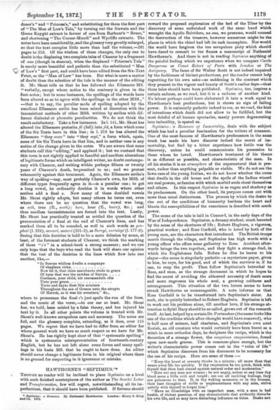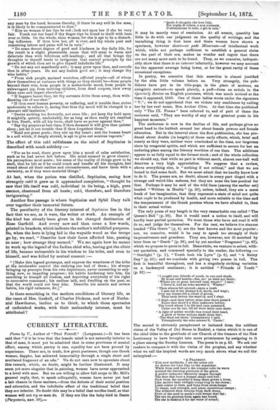HAWTHORNE'S " SEPTIMIUS."* THOUGH no reader will be inclined to
place Septimius on a level with such finished masterpieces of the author as The Scarlet Letter and Transformation, few will regret, notwithstanding all its im- perfections, that it should have been published. If fortune should
Septimius: a Romance. By Nathaniel Hawthorne. London: Henry S. King and On. 1872.
reward the proposed exploration of the bed of the Tiber by the discovery of some unfinished work of the same hand which wrought the Apollo Belvidere, no one, we presume, would counsel the destruction of the treasure, however numerous might be the places in which the chisel had left its task incomplete. Nor would the world have forgiven the too scrupulous piety which should
have dared to commit to the flames a manuscript of Nathaniel Hawthorne's. And there is not in reading Septimius anything of the painful feeling which we experience when we compare Castle Dangerous or Count Robert of Paris with Ivanhoe or The
Antiquary. The fame of Sir Walter Scott is not indeed impaired by the feebleness of his last productions, yet the reader cannot help regretting for his own sake—so saddening is the contrast which they present to the vigour and beauty of Scott's earlier days—that these tales should have been published. Septimius, too, inspires a certain sadness, as we read, but it is a sadness of another kind. No labour perhaps could have elaborated it into a work equal to Hawthorne's best productions, but it shows no sign of failing power. It is eminently pathetic indeed to see, as we read, the hint of intentions which death did not allow to be fulfilled, but the most doleful of all human spectacles, manly powers degenerating into imbecility, is spared us.
Septimius : a Romance of Immortality, deals with the subject which has had a peculiar fascination for the writers of romance. One of the most famous of Hawthorne's predecessors in the same
track has made his hero discover indeed the secret of im- mortality, but find by a bitter experience how futile was the
discovery, unless he could communicate his possession to those whom he loved. Hawthorne's treatment of his theme is as different as possible, and characteristic of the man. In all his stories it is an atmosphere of the supernatural that is pre- sent, rather than anything palpable or visible. We do not see the fawn ears of the young Italian, we do not know whether the curse that dwells in the old house and the spells of the Indian wizard are real powers, or fancies with which morbid souls cheat themselves and others. In this respect Septimius is as vague and shadowy as its predecessors. On the other hand, its purpose comes out with more than usual distinctness. The process by which the desire to rise out of the conditions of humanity hardens the heart and blunts the susceptibilities of the conscience is described with mach power.
The scene of the tale is laid in Concord, in the early days of the War of Independence. Septimius, a dreamy student, much haunted by the sense of the shortness of life ; Robert Hagburn, a vigorous, practical worker ; and Rose Garfield, who is loved by both of the young men, are the characters first introduced. The British troops march through the village, and Septimius has high words with a young officer who offers some gallantry to Rose. Accident after- wards brings the two together, and they fight a strange duel, in which the Englishman falls. Before he dies be leaves to his slayer—the scene is singularly pathetic—a mysterious paper, given to him, he says, for his good, and of which the survivor is, if he can, to reap the profit. Then follow Septimius's betrothal to
Rose, and soon, as the strange document in which he hopes to
find the secret of avoiding the abhorred necessity of death more and more engrosses his whole soul, a growing coldness and estrangement. This situation of the two lovers seems to have struck Hawthorne as unmanageable. A note informs us that Rose Garfield is to be transformed into Septimius's sister. As such, she is quietly betrothed to Robert Hagburn. Septimius is left to work out his problem alone, till another love, if his strange at- traction to Sybil Dacy should be so called, grows out of the research itself. At last, helped by a certain Dr. Portsoaken (the name looks like one of the crudities which after-thought would have removed), who is half man of science, half charlatan, and Septimius's own aunt Keziah, an old creature who would certainly have been burnt as a witch in more orthodox days, he deciphers the recipe, which is the decoction of a strange flower, the sanguinea sanguinissima, found upon new-made graves. This is common-place enough, but the
writer's characteristic power comes out in the "rules of life" which Septimius discovers from his document to be necessary for
the use of his recipe. Here are some of them :-
"Keep thy heart at seventy throbs in a minute ; all more than that wears away life too quickly. If thy respiration be too quick, think with thyself that thou haat sinned against natural order and moderation."
"Hate not any man nor woman ; be not angry, unless at any time thy blood seem a little cold and torpid; ant out all rankling feelings, they are poisonous to thee. If, in thy waking moments, or in thy dreams, thou haat thoughts of strife or unpleasantness with any man, strive quietly with thyself to forget him."
"Have no friendships with an imperfect man, with a man in bad health, of violent passions, of any characteristic that evidently disturbs his own life, and so may have disturbing influence on thine. Shake not
any man by the hand, because thereby, if there be any evil in the man, it is likely to be communicated to thee.' "Ries no woman if her lips be red ; look not upon her if she be very fair. Touch not her hand if thy finger-tips be found to thrill with hers ever so little. On the whole, shun woman, for she is apt to be a disturb- ing influence. If thou love her. all is over, and thy whole past and remaining labour and pains will be in vain."
"Do some decent degree of good and kindness in thy daily life, for the result is a slight pleasurable sense that will seem to warm and delectate thee with felicitous self-landings ; and all that brings thy thoughts to thyself tends to invigorate that central principle by the growth of which thou art to give thyself indefinite life." "Do not any act manifestly evil • it may grow upon thee, and corrode thee in after-years. Do not any foolish good act ; it may change thy wise habits."
"From sick people, maimed wretches, afflicted people—all of whom show themselves at variance with things as they should be—from people beyond their wits, from people in a melancholic mood, from people in extravagant joy, from teething children, from dead corpses, turn away thine eyes and depart elsewhere." "If beggars haunt thee, let thy servants drive them away, thou with- drawing out of ear-shot." "If thou seest human poverty, or suffering, and it trouble thee, strive moderately to relieve it, seeing that thus thy mood will be changed to a pleasant self-laudation." "Desire nothing too fervently, not even life ; yet keep thy hold upon it mightily, quietly, unshakably, for as long as thou really art resolved to live, Deatb, with all his force, shall have no power against thee."
"Say thy prayers at bed-time, if thou deemeet it will give thee quieter sleep ; yet let it not trouble thee if thou forgettest them." "Read not great poets; they stir up thy heart; and the human heart is a soil which, if deeply stirred, is apt to give out noxious vapours."
The effect of this cold selfishness on the mind of Septimius is described with much subtlety :-
"For as he read, there grew upon him a mood of calm satisfaction, such as he had never felt before. His mind seemed to grow clearer ; his perceptions most acute ; his sense of the reality of things grew to be such, that be felt as if he could touch and handle all his thoughts, feel round about all their outline and circumference, and know them with a certainty, as if they were material things."
At last, when the potion was distilled, Septimius, seeing how strangely cold it grew as it approached completion, "thought he saw that life itself was cold, individual in its being, a high, pure essence, chastened from all heats ; cold, therefore, and therefore invigorating."
Another fine passage is where Septimius and Sybil Dacy talk over together their immortal future.
The peculiarity of the literary interest of Septimius lies in the fact that we see, as it were, the writer at work. An example of the kind has already been given in the changed destination of Rose Garfield. And every now and then come. a few words, printed in brackets, which indicate the author's unfulfilled purposes. So, when the hero is lying hid in the wayside wood as the troops go by, we read, "Describe how their faces affected him, passing so near ; how strange they seemed." We see again how he meant to work up the legend of the Indian chief who, having got the elixir of life, became unbearable in his wisdom to his tribe, and even to himself, and was killed by mutual consent :— "[Make this legend grotesque, and express the weariness of the tribe at the intolerable control the undying one had of them ; his always bringing up precepts from his own experience, never consenting to any- thing new, so impeding progress ; his habits hardening into him, his ascribing to himsplf all wisdom, and depriving everybody of his right to successive command ; his endless talk, and dwelling on the past, so that the world could not bear him. Describe his ascetic and severe habits, his rigid calmness, &c.]" Is there something in the modern conditions of literary life, as the cases of Mrs. Gaskell, of Charles Dickens, and now of Natha- niel Hawthorne, incline us to think, to which these spectacles of unfinished works, with their melancholy interest, must be attributed ?



































 Previous page
Previous page